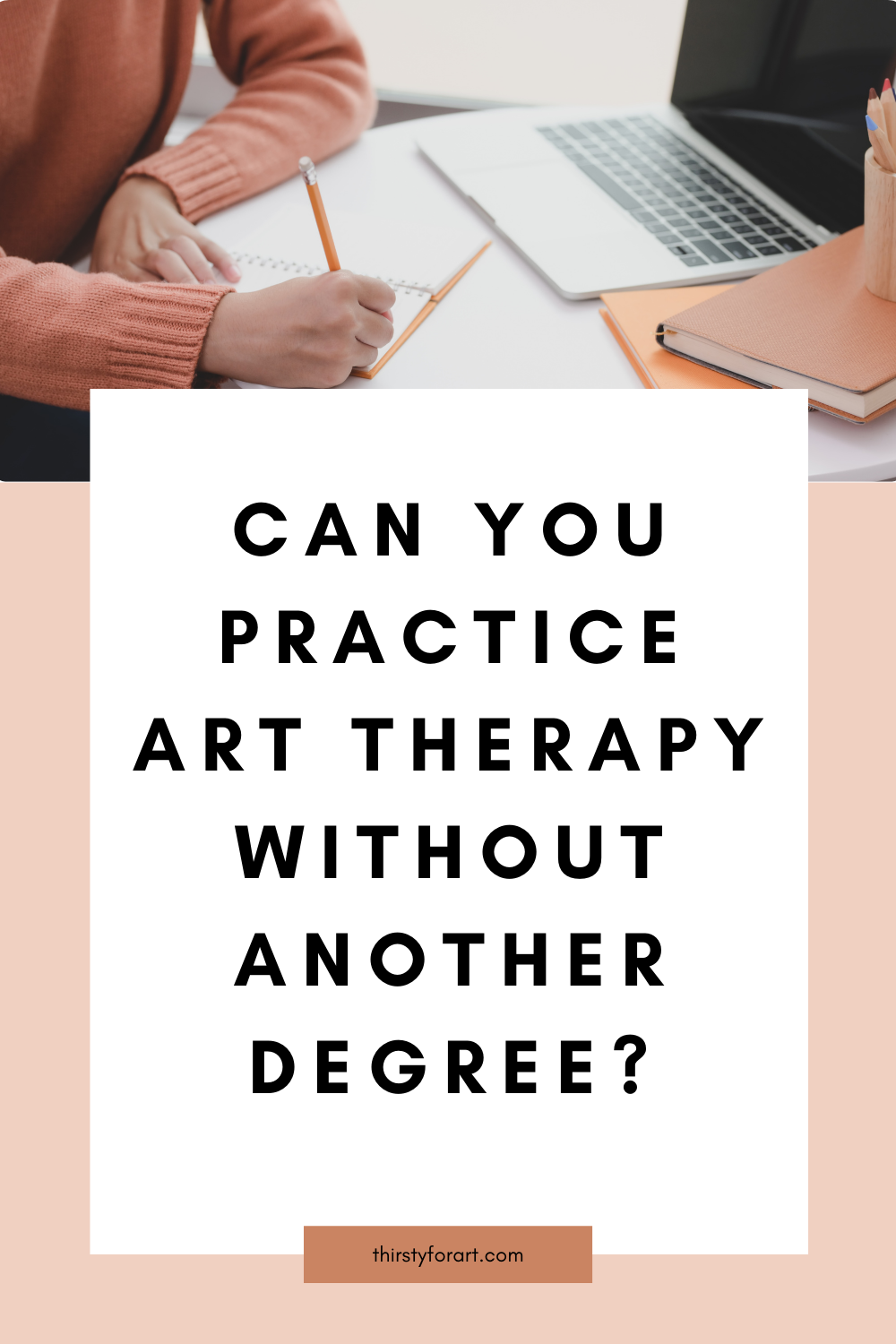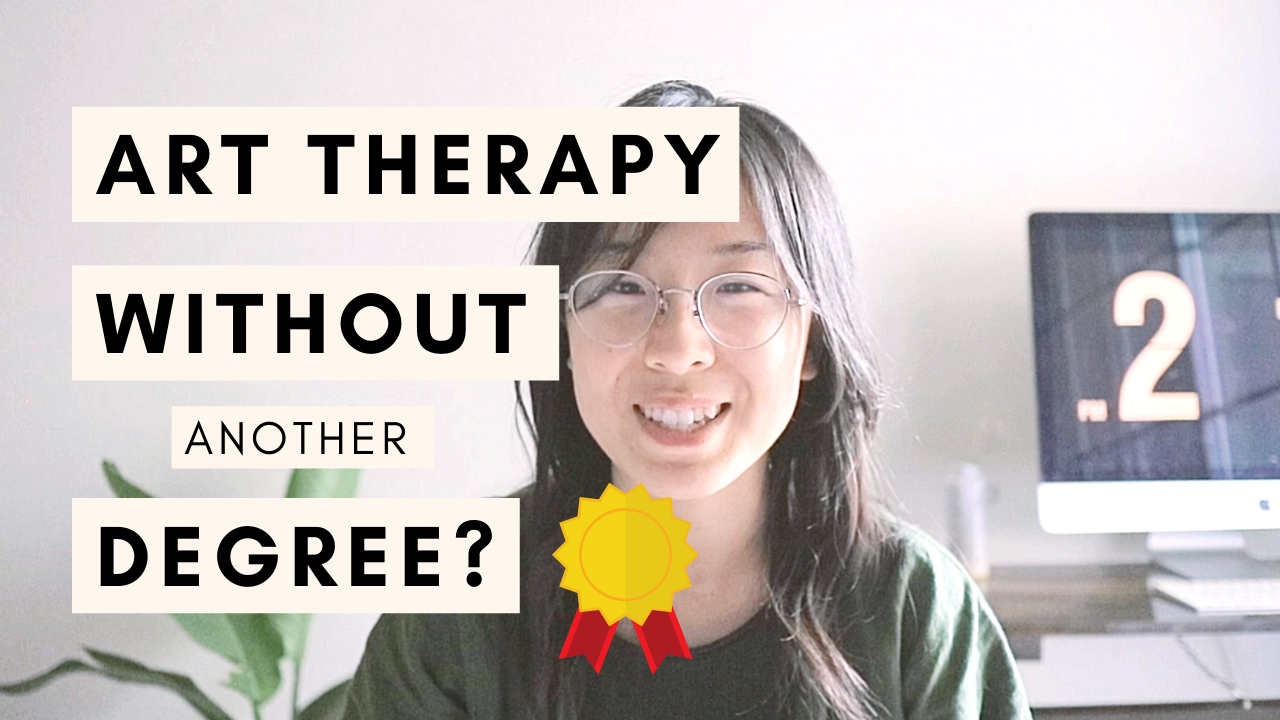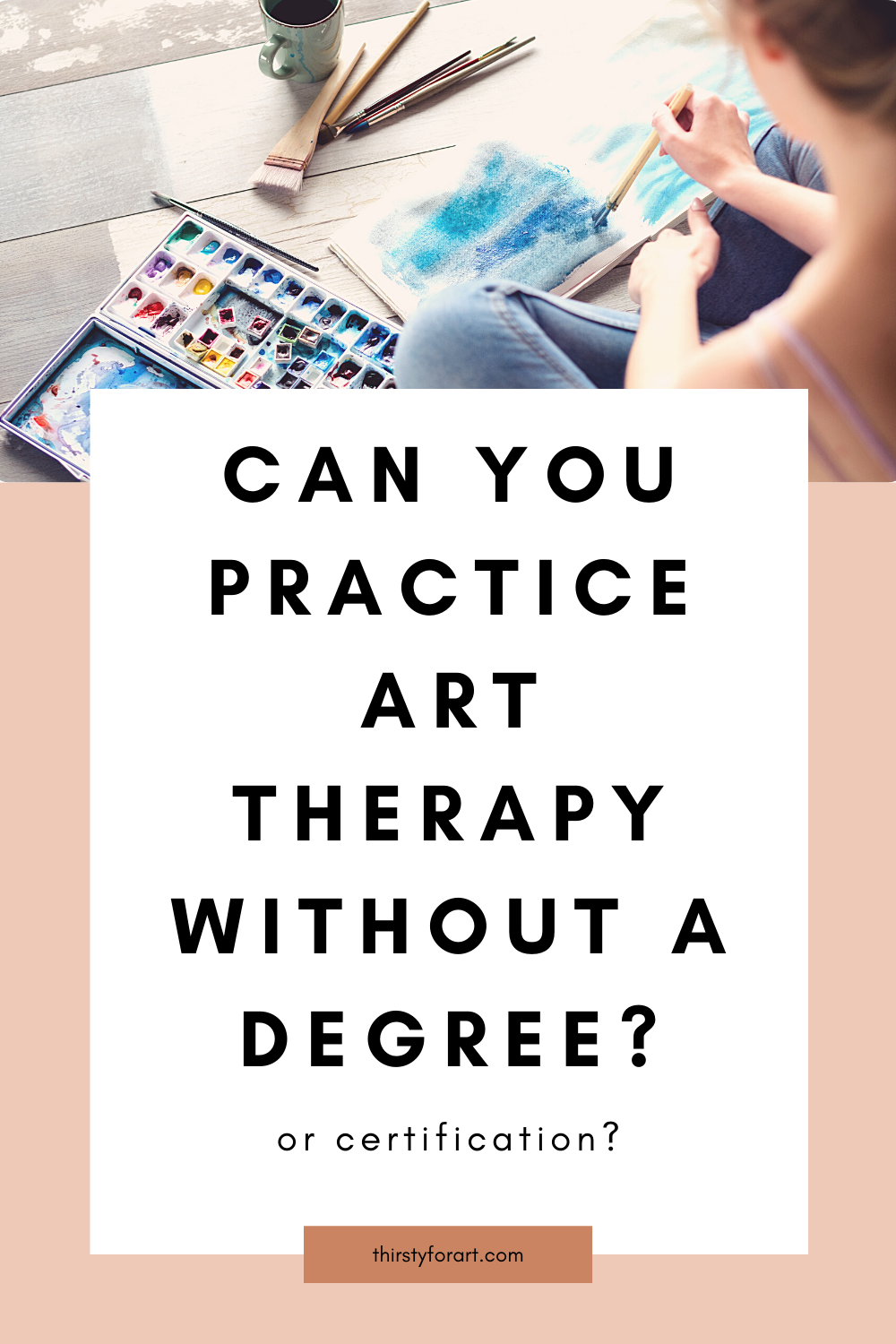Can You Practice Art Therapy Without Another Degree or Certification?
How to Practice Art Therapy Without Another Degree or Certification
Can you practice art therapy without getting another degree or certification?
Many people may already have a master’s in something else (mental health, psychology, counseling, social work, etc) and are interested in doing art therapy but don’t want to (or can’t) invest all the time and money that’s required to get another master’s degree in art therapy.
Honestly, it is a HUGE investment.
Also, there are some of you who are already an art therapist but you are in a tricky situation where there is no license in your state or it’s super complicated to get licensed in that state. What to do then?
So today I'm answering your question - whether it’s possible to practice art therapy without another degree or certification - which you may have guessed is a YES. But my answer is a little complex, so follow with me. There is an area where it’s going to require some sort of degree or certification…so I’ll share with you how you can go about it the easier way EVEN if you are required those things. **Note: I’m mostly covering what pertains to the U.S.**
If you want to watch the video version of this post, you can do so here:
So I have a 2-part answer to my YES. This is because it depends on the situation you’re in.
Here is the first situation:
You’re in a state without an art therapy license
If your state has no license rule or bill regarding art therapy or art therapists, then it means that that are no state rules or regulations around art therapy. It is the wild wild west. (Check here if your state has an art therapist license https://arttherapy.org/state-advocacy/ )
Essentially, you can probably start incorporating art today in your work - do art-based workshops, classes, sessions. However, your work wouldn’t be considered “art therapy” and I advise you don’t call that). You wouldn’t suddenly become an “art therapist” in that state, because in the U.S. at least, The American Art Therapy Association (the professional association) defines art therapy as a service provided by an art therapist who has at least a master’s in art therapy.
In those states that don’t have a license or regulation around art therapy, you have to keep in mind that you likely won’t find jobs out there for art therapists because your state doesn’t license art therapists (it’s rare employers will look for art therapists in these places). So you would likely need to go the self-employment route - create the job yourself.
Important thing to note is that you want to stay in the scope of your work, meaning you don’t want to be doing “art therapy” (as mentioned above), nor “psychotherapy,” counseling, etc. since those are terms and scopes of mental health work that are defined and regulated by the state, or in the case of art therapy, the national AATA organiation. Thus, you gotta be clear that you're not doing those things.
And of course, you also want to check your state law and the bills passed in your state, since an art therapy license bill can be signed any year.
** IMPORTANT: Please note that this is not legal advice and I am not a legal professional! Please talk with your lawyer, attorney, or other legal professionals if you want to find out more about this topic.
With that said, even though it may be okay to do "therapeutic art” work in these states, you want to want to make sure that you’re knowledgeable, capable and skilled to help people using through this creative medium. If you don’t have a master’s in art therapy, you can still go the route of therapeutic art or expressive art-based work, or simply incorporate art-making within your work.
If you’re hesitant about getting a whole master’s degree in art therapy, there are several ways you can get the experience (training) & knowledge when you are in a state without an art therapy license:
certificate programs (there are different kinds, other than the minimum 1-2 year nationwide certificate “ATR-BC”)
courses (online or in-person)
classes
apprenticeship
self-study (literature) + experience (if you’re in a country w/o art therapy)
But what if you are in a state WITH an art therapy license rule in place?
2. You’re in a state WITH an art therapy license
Alright, in this case, you need to be a licensed art therapist to practice art therapy in these states. So here is what you can do to do art therapy in these states.
Post-master’s certificate programs
If you already have a master’s degree (in therapy, psychology, counseling, social work, etc) and you want to pursue “clinical work” and get “jobs,” then doing a post-master’s certificate program is a great option.
This is basically a master’s level program suited for people who already have a mental health degree but need to get the art therapy courses or credits in order to qualify for the art therapy board certification (ATR-BC) and/or get an art therapist license in your state.
It’s not going to take as long as a full-time art therapy master’s degree, so that’s a great benefit of this.
Here are a list of places you could look into (not endorsing them in any way):
Adler Graduate School https://alfredadler.edu/programs/post-masters/credential-only-art-therapy
Edinboro University https://www.edinboro.edu/_resources/documents/academics/post_masters_art_therapy_fact_sheet.pdf#search=art%20therapy%20certificate%20program
Southwestern College & New Earth Institute https://www.swc.edu/atcp/
Caldwell University (NJ) https://www.caldwell.edu/graduate/grad-admission-requirements/post-graduate-m-a-in-art-therapy/
Ursuline College https://www.ursuline.edu/academics/graduate/programs/counseling-and-art-therapy
Notre Dame de Namur University https://www.ndnu.edu/education-and-psychology/graduate/art-therapy/ (8/2021 update: program is not found on its website anymore; my guess is that they ended it. I suggest you call their admissions office to inquire directly).
But what if you don’t need to or want to work in clinical settings or go for these programs? Then you could consider…
Non-clinical work
What I mean by “non-clinical” work is helping people who do not have mental illness diagnosis or working in settings that are not medical or mental health.
I also like to call this the “creative wellness” type of work. There are many names for this type of work. I like to call it therapeutic art.
I believe art therapy can come in many different forms, and it doesn't always have to be "clinical" - art therapy as a treatment for mental illness and those with diagnoses.
With non-clinical work, you are basically helping people outside of the usual mental health treatment settings or medical settings. And this means that you are not doing "mental health treatment" or psychotherapy.
And thus, you are working more in the realm of human service, "life coaching," or of the creative "wellness" field. Helping people improve themselves through using therapeutic art, or "art as healing" type approach.
So technically, you are not doing "art therapy" — as in psychotherapy, but you are using art as an expressive, healing tool.
And how do you actually do this? You can do freelance or open up your own office/business that offers these services to people. You might not be able to consider or call your services strictly "art therapy" or call yourself an "art therapist" per se, because those are titles only reserved for those who are licensed art therapists within your state, but you can be really creative with what you call your services and yourself. It matters not what your title is, it matters that you help people.
I don't want you to be stuck and helpless in a situation because there is a lot of obstacles and limitations around this idea of art therapy work.
I want to inspire you to open up to different possibilities and remind you of the reason why you want to do this work - you want to help people from the inside out, through using art as an expressive medium. You are here to do amazing work. It's calling you out to do it.
I hope this helped you in some way.
P.S. If you are curious about how to pursue an art therapy career in your specific situation, I can help you with that in my 1:1 career consult here.
With that said, I really hope that this was helpful for you. Thanks and see you next time!
--




